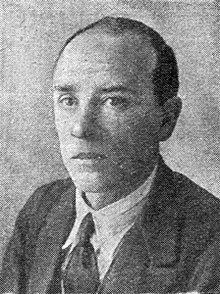Vyacheslav Alexandrovich Malyshev
Vyacheslav Alexandrovich Malyschew ( Russian: Вячеслав Александрович Малышев ; * December 3 July / December 16, 1902 greg. In Ust-Sysolsk ; † February 20, 1957 in Moscow ) was a Soviet politician and party official. From October 16, 1952 to March 3, 1953 he was a member of the Presidium of the Central Committee of the CPSU .
Beginning of career
Malyshev came from a family of teachers. He began to be interested in Bolshevism at a very early age and at the age of 16 was first assistant to the secretary and in 1919 to secretary of the so-called People's Court in the Russian provincial town of Velikiye Luki . After the end of the Russian Civil War , he worked as a locksmith in a railway works and at the same time attended evening courses at a technical school for railway engineering, which he graduated in 1924.
From 1930 he studied in Moscow at the Moscow Technical University "Nikolai Bauman" . Even as a student, he dealt with the problem of building locomotives and even led test drives of diesel locomotives. After graduating in 1934, he worked in the Kolomna Railway Works , where he only stayed for a short time. Since the Stalinist purges claimed many victims among the experts in business and technology and as a result there was a blatant shortage of capable young talent, within a few years Malyshev went from simple engineer to deputy general director and then general director of the Kuibyshev locomotive building in Kolomna. On February 5, 1939, after the reorganization of the specialist departments, he was appointed People's Commissar for Heavy Mechanical Engineering of the USSR. At the same time he rose in the party hierarchy and in 1939 became a member of the Central Committee of the CPSU . From October 1940 to May 1944 Malyshev was deputy chairman of the Council of People's Commissars of the Soviet Union and chairman of the council for mechanical engineering. At the same time he was from October 1940 to September 1941 People's Commissar for medium-sized mechanical engineering. During the Second World War , from September 1941 to July 1942 and then again from June 1943 to October 1945, he was in charge of tank production in the Soviet Union as People's Commissar for tank production. Malyshev was awarded the Order of Heroes of Socialist Labor for "great merits in the creation of economic foundations" for the victories of the Soviet armed forces in 1944 . In addition, he was awarded the military rank of Colonel General of the Engineering Service.
After the Second World War
After the war, from October 1945 to December 1947 he was People's Commissar (from 1946 - Minister) for Transport Engineering, from 1948 to 1949 he was simultaneously Minister for Mechanical Engineering and Chairman of the State Committee for Economic Rationalization Measures and until March 1953 Deputy Chairman of the Council of Ministers of the Soviet Union . From January 1950 to October 1952 he took over the Ministry of Shipbuilding of the USSR. As a result, he did not belong to the highest government or party leadership in the country, so that his "election" as a member of the Presidium of the Central Committee of the CPSU, the highest party organ, which came about at the personal suggestion of Stalin , was completely unexpected for everyone. However, he and almost a dozen other newly elected people were expelled from the Presidium of the Central Committee immediately after Stalin's death on March 6, 1953. Then he was again Minister for Transport Engineering and Heavy Engineering for a few months.
After that, Malyshev's career went steadily downhill. At first deputy chairman of the Council of Ministers of the Soviet Union and from June 1953 to February 1955 as head of the Ministry of Medium-Sized Mechanical Engineering one of the main people responsible for Soviet rocket construction, after serious disagreements with the head of state and party, Nikita Khrushchev, in 1955 he became chairman of a rather insignificant one State committees for the new technology appointed at the Council of Ministers of the Soviet Union. But even after that his descent continued unstoppable. In mid-1956 he was demoted to deputy chairman of the economic committee for ongoing planning, but died a few months later of a serious heart condition. In recognition of his services to the Soviet war industry, the urn with Malyshev's remains was buried on the Kremlin wall .
Awards
- Hero of Socialist Labor (1944)
- Four times holder of the Order of Lenin
- Suworoworden 1st class
- Kutuzov 1st class
- Twice winner of the Stalin Prize
The Malyshev plant in Kharkov was named after him in 1957.
literature
- Nikolaj Zenkovič: Ėlita. Samye zakrytye ljudi. Moscow, 2003. ISBN 5-94850-035-7 . (German: The elite. The most secret people).
- Alexei Abramov. At the Kremlin wall, Berlin (East), 1984.
- Rukowoditeli organow sowetskogo gosudarstva. Sbornik biografij. Moscow, 1999 (German: Head of organs of the Soviet state. Biographies).
| personal data | |
|---|---|
| SURNAME | Malyshev, Vyacheslav Alexandrovich |
| ALTERNATIVE NAMES | Малышев, Вячеслав Александрович (Russian) |
| BRIEF DESCRIPTION | Soviet politician and party official |
| DATE OF BIRTH | December 16, 1902 |
| PLACE OF BIRTH | Ust-Sysolsk |
| DATE OF DEATH | February 20, 1957 |
| Place of death | Moscow |
